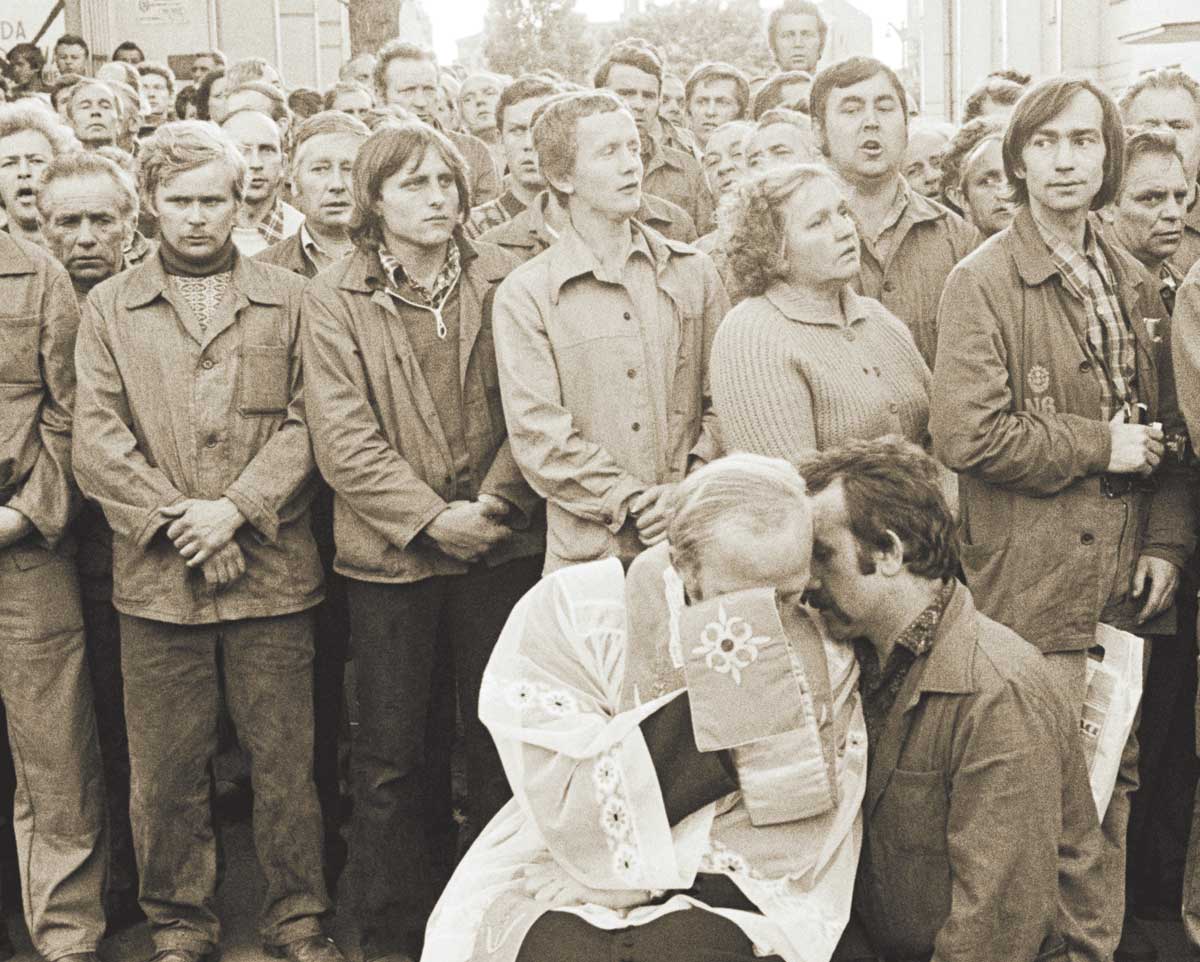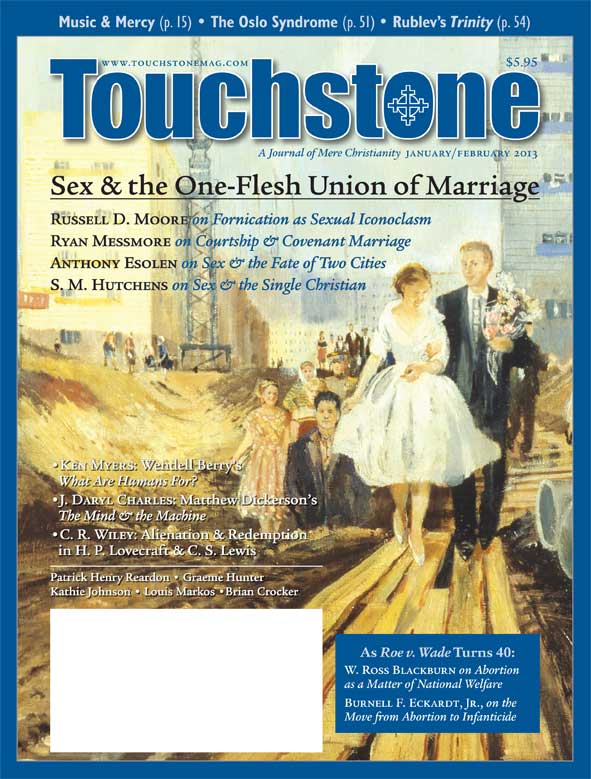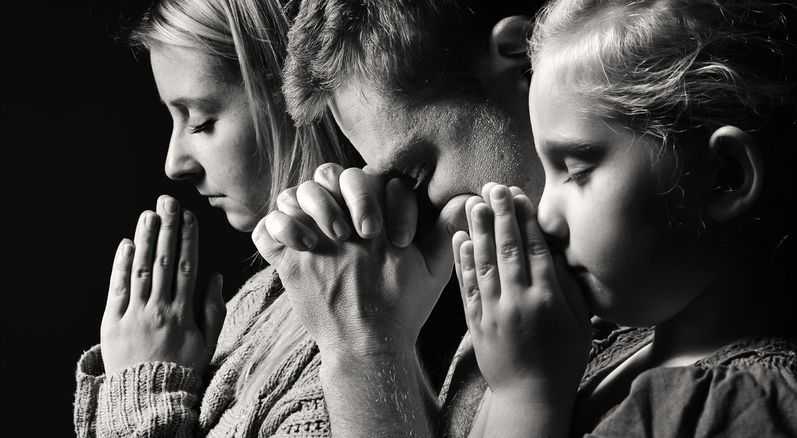Feature
Scarborough Needs Men
Manly Chastity, Hedonism & the Law of Non-contradiction
Scarborough, Ontario, is a sprawling urban growth on the side of Toronto. A large group of people, including children, are attending a block party, when a car driving past sprays them with bullets. Two people are killed and another 23 are injured. One of the slain, the target of the attack, was a young man who had been spearheading an appeal to teenagers before they took to the street gangs and drugs and violence.
Two days later, no arrests have been made, even though police feel sure that many of those attending the party know who was responsible. The chief appears on television, pleading with the people of Scarborough to come forward with information. But terror, or divided loyalty, or some of both, proves stronger than civic duty.
Meanwhile, tearful and angry mothers demand that the government of Ontario "do something about it." That something is a devoutly to be wished "program" designed "to keep kids off the streets." It's taken for granted that streets are and always have been bad places. Gangs are on "the streets." Indeed, the chief of police opines that the attack, too sloppy for the well-established Ontario gangs, is the work of a new one. No one asks why Scarborough is so prolific in the export-import of evil.
The Story of Hospital Hill
Eastland is a small town in Texas, with a population under 4,000. Every weeknight—not Sunday night, because a lot of people would be attending evening services, and besides, Sunday is Sunday—some 30 to 50 men, from the right and the wrong side of the tracks, have been showing up at Hospital Hill, so called for what the Eastlanders had determined to build there. The men include manual laborers, but also lawyers, ministers (note the plural), merchants, and a young doctor. In seven hours one night they poured a hundred cubic yards of concrete, and not a man among them had had any experience of that work. They have laid thousands of feet of steel girders. They have snaked more than ten thousand feet of electrical wire. "One night," wrote reporter Richard Davids, "just above freezing, 35 men put on 4,000 square feet of roof decking in a 20-mile-an-hour north wind."
How do you pay men to do work like that? The reporter knows. No amount of money would do. No payment except "coffee and doughnuts"—gallons of coffee and hundreds of doughnuts, every night, whipped up by the women of Eastland. They, too, have been busy. They've been planning the colors for the walls, curtains, pictures, and bed linens—thousands of hours, working to make the new town hospital a human and comfortable place. The men, when weary, go down for refreshment and chat, showing off their calluses.
Work would halt between 11 p.m. and midnight, and the names of the men and women who had served would appear in the morning newspaper. For nine months the good people of Eastland toiled, until finally they had their new hospital, built without a dime of government money. Its first patient, wrote Davids, was "an 8½ pound Texan, who brought his mother along, and who made the front page of the Telegram that night." A full-page photo shows a huge laundry basket spilling over with sugared doughnuts, and a room packed with happy people: men in coats and ties, women in dresses, and nurses in white frocks and caps.
A Peace That Can't Be Made
It's a nice story, that of Eastland. It's also an old story. I found it in the June 1956 issue of Town Journal, a family magazine (note that there was such a thing). There are plenty of reasons why those men could not build a hospital now, but I'd like to focus on one particular sine qua non: Eastland presupposed a country of marriage. Scarborough is what you end up with when you have battered marriage into the pavement.
It surprises me that Christians still believe that one can have a country of marriage while "tolerating" (meaning: condoning, granting tacit approval to) fornication, cohabitation, easy divorce, and, for those so disposed, same-sex pseudogamy. They believe that hedonism and its uglier cousin, the worship of autonomy for its own sake, are compatible with a free, self-governing society. They believe you can fulfill the demands of feminists and homosexuals and work for a world in which children grow up under the loving authority of their fathers. They want the moral laxity of Scarborough and the moral strength of Eastland. They want Sodom to make peace with Jerusalem. They want to suspend the law of noncontradiction.
It cannot be. It never could be. Let's examine why not.
An Ineradicably Social Condition
I know better than to assume that the people of Eastland were saints. But we don't require sanctitude for Eastland; we require virtue. Eastland was a place where fornication was severely censured, abstinence was encouraged as self-control, and chastity was honored. It doesn't mean that everyone was chaste. It does, however, mean that most people would attempt to be chaste most of the time, or at least to limit the extent and the damage of their sins against chastity. It means that almost all children were born within wedlock, and would grow up with both a mother and a father.
Scarborough, by contrast—here one may substitute the name of any place in the United States or Canada—is a place where fornication is expected, abstinence half-heartedly encouraged to keep the works clean, and chastity ridiculed. That means that huge numbers of children are born out of wedlock (in Quebec, province des batardes, more than half) and will not grow up with both a mother and a father.
What does that mean? Consider what is involved in the struggle for chastity. Even if one does not learn the reverence owed to sexual being, one must learn to delay gratification and to see one's sexuality as involving responsibilities to one's neighbors, for promoting or safeguarding the common good. Being male or being female, then, is not just a physical condition. It is ineradicably social: it is for others.
Most obviously, men are for women and women are for men: and both men and women, precisely as men and women and not simply as individuals, are for the community. That community is built upon the foundation of the family: man for woman, woman for man, and both together for the children born from their acts of self-giving in married love.
A People versus a Population
Let us tease out the implications for Eastland. One cannot believe, simultaneously, in chastity and in the primacy of "fulfilling" oneself sexually. Chastity instructs us that our most urgent drive, most difficult to master, is for others; it is for marriage and children. But hedonism teaches that everyone else must honor how I choose to be directed by that drive: all must yield to me, and I yield to the urge. These beliefs are in direct contradiction. One cannot worship both God and Belial.
Hedonists may sacrifice a great deal to secure greater pleasure; exercise fanatics come to mind. But they will not sacrifice a great deal, without glory, for their neighbors, among their neighbors. Hedonists do not give up several nights a week, for nine months, to nail shingles to a roof or mix cement. When the novelty wears off, they will lose interest and go home, or to the nearest bar. Will they shoulder the Cross? They will not for long shoulder even a four-by-four.
Note also that "the people of Eastland" and "the people of Scarborough" are not of one kind. The people of Eastland really are a people, and the people of Scarborough are a population: individuals who happen to live within certain geographical or political boundaries. What do chastity and hedonism have to do with that? Chastity is oriented toward permanence; hedonism, toward transience. I am not speaking simply about permanence of location. I'm well aware of the opportunities and the dangers that mobility poses. I am speaking about the inner meaning of the virtue, and the unmeaning of the vice.
The chaste youth says, "I will not give myself up now in sexual intercourse, because when I do, it will be with the blessing of God and my neighbors, it will be for my wife, it will be for the children we hope to have, and it will be for life." The hedonist says, "I choose to pursue sexual intercourse now. It's my choice and mine alone. I don't want children, so I will act to thwart that possibility. I will stay with this partner just so long as I like, and when I like, I will move on."
Set aside for the moment the stability of the family. The hedonist places transience at the heart of what ought to be the most significant act of self-giving that most people will be called upon to make. Indeed, the hedonist insists upon the transience: the "freedom" to leave by the nearest exit. It should be clear that such people will not long unite for the sake of anything difficult or demanding. They cannot truly form a people, because each is too busy gazing Narcissus-like into the pool of his own delights. No sane person would entrust anything of value to a person whose idol is pleasure; and that will include savvy hedonists themselves.
Boys Taught by Men
Then we have the sexes. One of the odd things about the account of the hospital-building in Eastland is that Davids doesn't say what the young men were doing. Presumably it was unnecessary. They were doing what the older men were doing. That is, they had taken into their hearts their duties as men, duties they learned principally from their fathers, with the rightness of those lessons confirmed by their mothers.
In a healthy place, a country of marriage, it isn't just that young men will set aside their hankering for meaningless sexual liaisons and destructive adventures, and agree to strain their shoulders and backs for nine months without pay for the sake of the common good. They will define their masculinity by the self-giving action: they will be proud to be considered men among men.
In other words, we are not talking about the suppression of masculinity—abstinence from manliness—but about its flourishing, separating the true from the false. And the false is an ever-present threat. Books written for adolescent boys in the 1950s are refreshingly clear about the wrongness of fornication. I have one in mind: A Doctor Speaks to Boys. Most boys who say they have done brazen things with girls are engaging in empty boasts, says the author (and that implies a great deal about the girls). But in any case, fornication is unmanly. True manhood implies dominion over one's desires and a far-sighted concern for others. Sexual intercourse is for marriage, as the nature of the act abundantly testifies, and that is that.
This lesson can be taught to boys only by men. The well-meaning feminist Christian, if she tries to teach it at all, can only present it as an extrinsic rule that constrains the boy and benefits her. But a man can embody this truth for other men as law—the God-given and internally embraced principle of order, bringing wholeness and freedom.
A Parody of Order
Without such order, the townsmen will not build that hospital. Their wives—or, now, their concubines—will not trust them to go where they say they are going. You will have thirty or fifty men every night with an excuse to be out of the house, with no definite time for returning. You will have no acknowledged hierarchy among the men, determining what jobs are to be done, by whom, how, and when. You will have, because of the vagaries of feminism, women hanging about the construction site also, with all the attendant distractions.
Eastland could raise a hospital from the ground in nine months. Scarborough cannot even raise children. That is the import of the citizens' complaints: the government of Ontario is responsible. Premier McGuinty promises aid. Lots of luck with that. McGuinty is a feminist flunky. His grand cause of the moment is to compel Catholic schools to sponsor homosexual clubs. Scarborough needs men, and boys inspired by a healthy manhood; McGuinty gives them the glories of sodomy and the indefiniteness of "gender." Scarborough's mayor grumbles about the uselessness of "hug a thug" programs, and McGuinty replies, unwittingly conceding the point, that at least they are "a step in the right direction."
Soul searching and admission of sin? That occurs to no one. It cannot, because at the heart of the sexual revolution lie selfishness and a rejection of order. No wonder, then, that many young men, and the young women who are sleeping with them, turn to an evil parody of order and of self-sacrifice, provided by the gangs. They have chosen an evil something over a contemptible nothing.
Built upon Nothing
A final word for Christians. The sexual revolution is a suicide pact. It is an embrace of nothing. What should a man be? No idea. What should a woman be? Whatever she wants; it doesn't matter. Are men and women for one another? No. When should a man and a woman engage in sexual intercourse? Whenever, whatever. What is marriage? Something romantic or other. Are certain forms of sexual behavior abnormal or unnatural? No; whatever floats your boat. Should children be brought up with a mother and a father? Who cares?
This is not to build a house upon sand. It is to build it upon nothing—if one manages to put two boards together in the first place. In one sense, then, we have an easy task, if we remain faithful to the Word of God: to bring Someone to people who have no one and nothing.
What stands in our way but sin? Not the sins of other people, but our own. There lies the difficulty. But that, too, is not a new thing in the world. The way to the risen Christ passes up the mount of Calvary; always has, and always will. •
Anthony Esolen is Distinguished Professor of Humanities at Thales College and the author of over 30 books, including Real Music: A Guide to the Timeless Hymns of the Church (Tan, with a CD), Out of the Ashes: Rebuilding American Culture (Regnery), and The Hundredfold: Songs for the Lord (Ignatius). He has also translated Dante’s Divine Comedy (Random House) and, with his wife Debra, publishes the web magazine Word and Song (anthonyesolen.substack.com). He is a senior editor of Touchstone.
subscription options
Order
Print/Online Subscription

Get six issues (one year) of Touchstone PLUS full online access including pdf downloads for only $39.95. That's only $3.34 per month!
Order
Online Only
Subscription

Get a one-year full-access subscription to the Touchstone online archives for only $19.95. That's only $1.66 per month!
bulk subscriptions
Order Touchstone subscriptions in bulk and save $10 per sub! Each subscription includes 6 issues of Touchstone plus full online access to touchstonemag.com—including archives, videos, and pdf downloads of recent issues for only $29.95 each! Great for churches or study groups.
Transactions will be processed on a secure server.
more on fatherhood from the online archives
more from the online archives

19.10—December 2006
Workers of Another World United
A Personal Commemoration of Poland’s Solidarity 25 Years Later by John Harmon McElroy
calling all readers
Please Donate
"There are magazines worth reading but few worth saving . . . Touchstone is just such a magazine."
—Alice von Hildebrand
"Here we do not concede one square millimeter of territory to falsehood, folly, contemporary sentimentality, or fashion. We speak the truth, and let God be our judge. . . . Touchstone is the one committedly Christian conservative journal."
—Anthony Esolen, Touchstone senior editor











